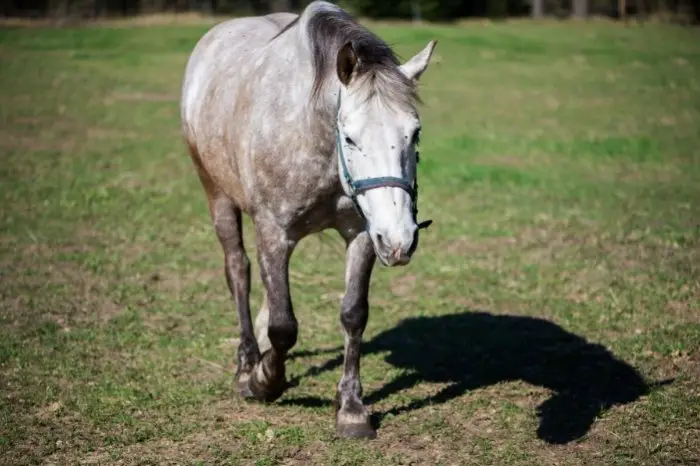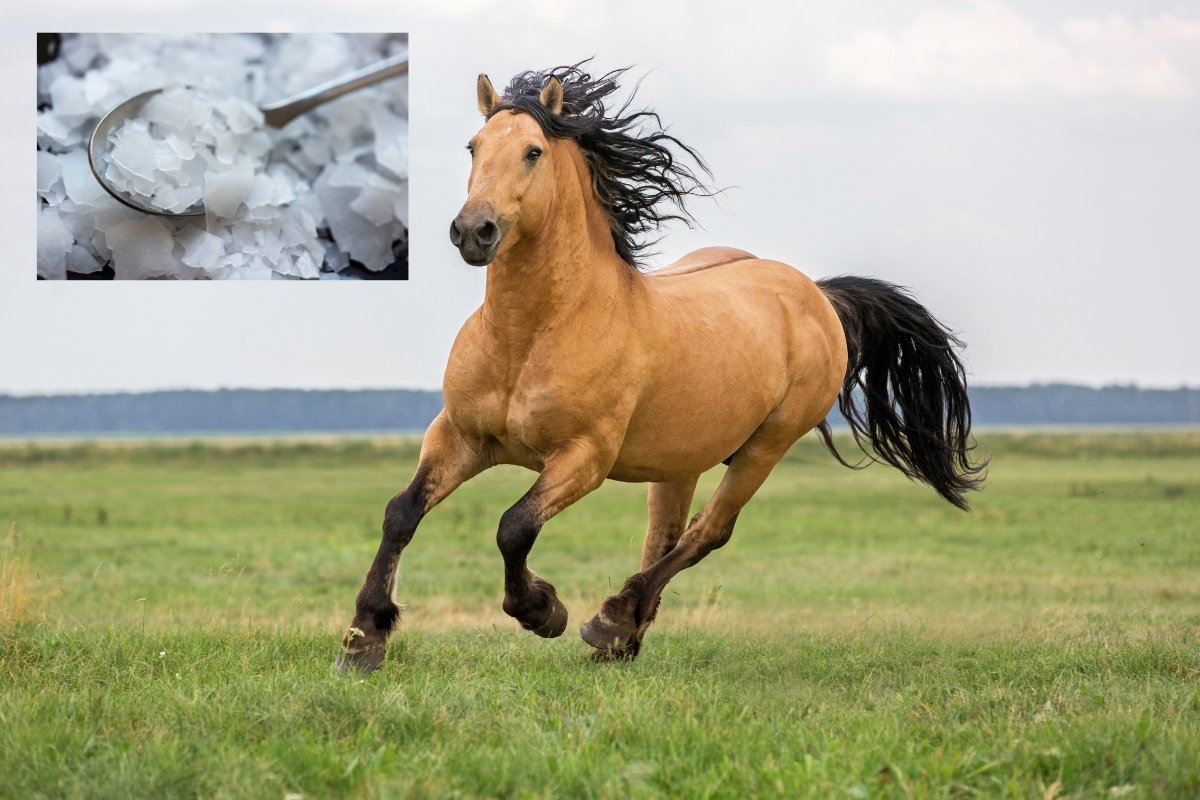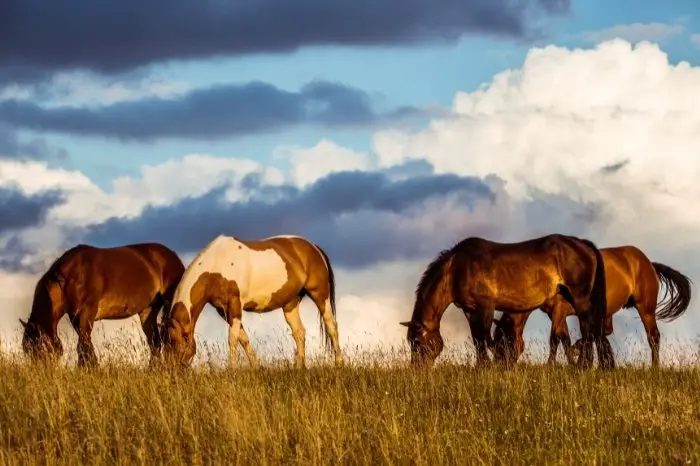Last Updated on October 18, 2021 by Cristina
Magnesium is an important mineral that plays an essential role in a horse’s health. However, you may wonder, what effect does magnesium have on horse growth? Many people don’t realize just how important magnesium is to horses.
A well-balanced diet is the key to a healthy, happy horse. Magnesium is one of the most important minerals in your horse’s diet. It plays many important roles in the overall well-being of a horse.
What Is Magnesium?
Magnesium is a mineral that is crucial to a horse’s body function. It plays a vital role in nerve and muscle function in equines. It works to regulate over 325 enzymes in a horse’s body.
Magnesium, which is also an important part of people’s diets, increases oxygen delivery to muscle tissue while promoting muscle strength, endurance, and relaxation. In addition, magnesium also activates the enzymes needed for the metabolism of carbohydrates and amino acids, which in return creates protein synthesis.

Where Is Magnesium Found In A Horse’s Diet?
Magnesium is found in forages and grains. The amount of indigestible fiber and the presence of oxalates in forages will affect the amount of magnesium they have.
Magnesium can also be in supplements. It can be either inorganic, such as magnesium sulfate, or magnesium oxide, or organic, such as chelated magnesium. In addition, magnesium sulfate, or Epsom salt, is another common source of magnesium for horses.
Oftentimes, spring grass is magnesium deficient due to the fact that it grows so fast. Adding magnesium to a horse’s diet during this time can have a calming effect on them.
What Effect Does Magnesium Have On Horse Growth?
Magnesium works closely with calcium to maintain proper muscle function in a horse. When muscles receive nerve signals to contract, special compartments within cells release calcium which moves onto muscle fibers, leading them to contract. Magnesium, on the other hand, stops the contraction by pushing calcium back into its special compartments.
The fact that magnesium and calcium work closely together helps contribute to healthy growth. It helps support healthy bones, which is vital for growth and development. In addition, it also contributes to the overall health of horses.
Uckele Magnesium Oxide, Horse Supplement, 10 lb
About 60% of a horse’s magnesium is found in bone and 40% in skeletal muscle tissue and extracellular fluids. In order for a horse to grow healthy and strong, they must have the proper amount of magnesium in their bones and skeletal muscle tissue.
As an important part of skeletal growth, magnesium is vital for the growth and development of a horse. Horses that are heavily exercised and young foals often need higher levels of magnesium to maintain a healthy, strong build. Without the proper amount of magnesium, you risk disordered neural or muscular function.
What Are The Other Benefits Of Magnesium?
Magnesium has many other benefits for horses as well. It works to create muscle relaxation, as it is able to support recovery while also helping to ease muscle pain and cramping in horses post-workout. In addition, it also helps nerve cells send signals to one another and to muscles by regulating ion balance in cell membranes.
Magnesium is also proven to have a calming effect on horses, helping those with tremors and nervousness. It can be fed as a supplement to reduce excitability or abnormal behavior.
A horse that has proper levels of magnesium will also tolerate stress better and have better resistance to illness and injury. It also helps with the distribution of fat in the body, which can help prevent fatty pockets in the neck. For overweight horses, it can even help improve insulin sensitivity.
Proper levels of magnesium can also help prevent laminitis in horses. In addition, it can even help prevent obesity in horses.
How Much Magnesium Should You Feed Your Horse?
Magnesium is a micromineral, meaning your horse will need more of it compared to other minerals. According to the National Research Council, the daily requirement of magnesium for horses is approximately 20 mg per kg of body weight.
For horses that undergo moderate to intense work should have their intake increased by 1.5 to 2 times. Since horses lose magnesium as they sweat, they need to have a greater intake. Lactating mares may need up to 15 to 30 mg of magnesium per kg of feed to keep up with their milk production.
If you are unsure how much magnesium your horse should be getting, talk to a veterinarian or an equine diet specialist. They can help you determine the right amount your horse needs in order to maintain a healthy lifestyle. In some cases, they may recommend a change in diet or the addition of a supplement.
Magnesium Deficiency And Toxicity
In some cases, horses may experience magnesium deficiency. If this is the case, a horse will likely exhibit behaviors such as nervousness, excitability, problems concentrating, muscle spasms, fatigue, irritability, irregular heartbeat, increased sweating, and increased sensibility. For horses experiencing magnesium deficiency, supplements can be given to increase their magnesium levels.
Though rare, magnesium deficiency can occur in horses. Administering too much magnesium, such as with Epson Salts, can lead to diarrhea. In addition, horses with kidney problems may not be able to excrete excess magnesium, causing it to accumulate in the blood.

Benefits Of Magnesium For Growing Horses
Magnesium is perhaps the most important mineral for horses. It is vital for growing horses, as it helps with bone development. It is commonly in forages and grains and it can also come in the form of a supplement.
Magnesium is also vital to nerve and muscle function. It works closely with calcium to create muscle contractions It is an important aspect in the overall health and development of a horse.
Magnesium also helps calm excitable horses and reduce stress. It can even help reduce injury and illness in horses while also easing muscle pain and cramps. In addition, it helps to prevent laminitis and obesity while also improving insulin sensitivity.
Do you have any questions regarding what effect does magnesium have on horse growth? If so, please ask any questions regarding magnesium and horse health in the comment section down below.


